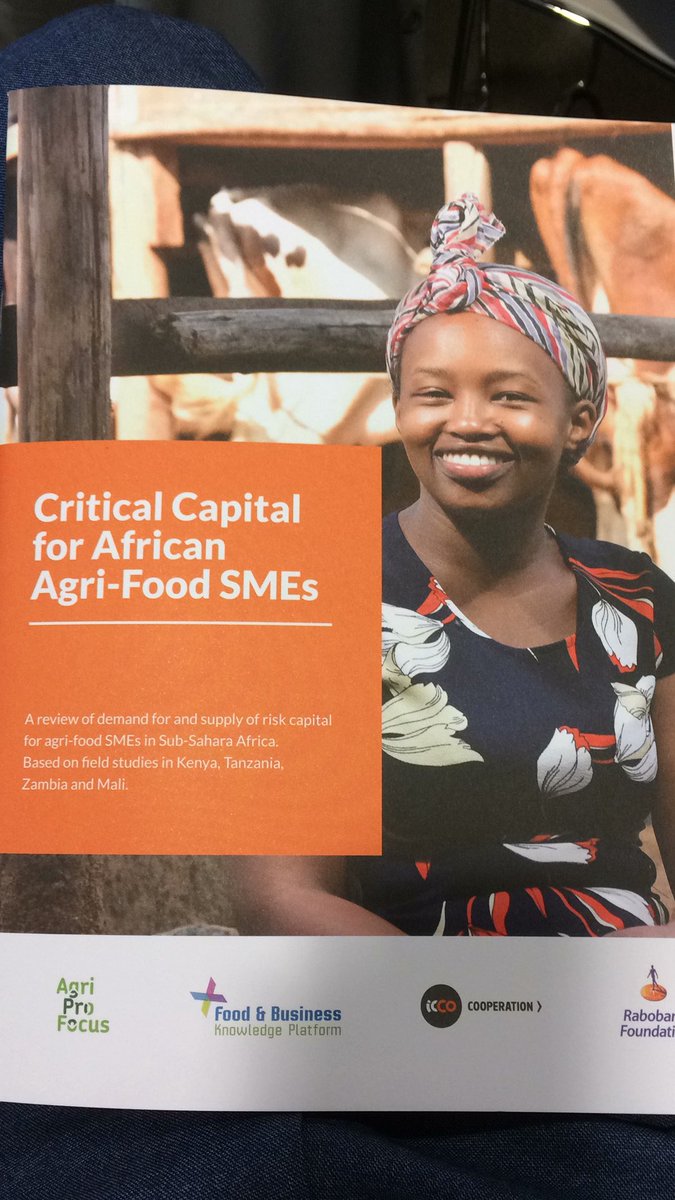Critical Capital forAfrican Agri-Food SMEs. A review of demand for and supply of risk capital for agri-food SMEs in Sub-Sahara Africa.
Based on field studies in Kenya, Tanzania, Zambia and Mali.
AgriProFocus, ICCO Cooperation and Rabobank Foundation supported by the Food and Business Knowledge Platform
May 2018, Utrecht, 60 pages
Agri-food SMEs in Africa, especially small and young companies, need better access to risk-taking investment capital. Agri-food SMEs occupy critical positions along the value chain and are conduits of technology and finance to farmers, in this way contributing to food security and family income. They also offer employment opportunities for the labour force. Their lack of access to risk-taking capital, holds agri-food SMEs back in their development.
There is a mismatch between the service offer of investment funds and demand expressed by agri-food SMEs. Investment funds essentially look for large deals, proven but scalable businesses with high growth rates and high return prospects. The majority of agri-food SMEs in Africa are small businesses that have modest financing needs and low return on capital. Moreover, they cannot meet the high standards of management and governance and extensive ESG and reporting requirements imposed by PE/VC funds, nor can they cover the costs of compliance. As a consequence, agri-food SMEs are being held back in their development and growth due to lack of access to risk-taking investment capital.
There is a need to develop a deliberate graduation strategy so that agri-food SMEs can make use of an assortment of services that match their development stage.
In order to realise a successful graduation strategy, this research calls upon:
The raison d’être of microfinance is to provide access to financial services to those who are excluded from the usual sources. Rapid progress has been made, particularly with very small enterprises in urban areas. But it has to be said that there is still a lot to be done: small and medium-sized enterprises (SMEs) are missing out. 90% of privately-owned companies in Africa are SMEs, but only 10% have access to any funding, making it difficult for them to grow.
AgriProFocus, ICCO Cooperation and Rabobank Foundation supported by the Food and Business Knowledge Platform
May 2018, Utrecht, 60 pages
Agri-food SMEs in Africa, especially small and young companies, need better access to risk-taking investment capital. Agri-food SMEs occupy critical positions along the value chain and are conduits of technology and finance to farmers, in this way contributing to food security and family income. They also offer employment opportunities for the labour force. Their lack of access to risk-taking capital, holds agri-food SMEs back in their development.
There is a mismatch between the service offer of investment funds and demand expressed by agri-food SMEs. Investment funds essentially look for large deals, proven but scalable businesses with high growth rates and high return prospects. The majority of agri-food SMEs in Africa are small businesses that have modest financing needs and low return on capital. Moreover, they cannot meet the high standards of management and governance and extensive ESG and reporting requirements imposed by PE/VC funds, nor can they cover the costs of compliance. As a consequence, agri-food SMEs are being held back in their development and growth due to lack of access to risk-taking investment capital.
There is a need to develop a deliberate graduation strategy so that agri-food SMEs can make use of an assortment of services that match their development stage.
In order to realise a successful graduation strategy, this research calls upon:
- Governments and development agencies to recognize the need for philanthropic capital and blending with substantially below market pricing in order to reach out to the smaller SME ventures. Of course subsidy elements should be removed as soon as possible. Governments and development agencies may need to revise the terms and conditions of their own investments to avoid mission drift of investment funds. Lastly, they can set up policy guidelines and conduct dialogue in order to support investments that specifically target start-ups and pre-growth SMEs in the agri-food sector.
- Regulators, donors and investors to come up with novel instruments and approaches that better serve the needs of small and young agri-food SMEs and make this critical capital available. NGOs, funds, development actors and governments should cooperate to ensure that the different instruments they offer to support SMEs, such as incubation/acceleration programs, challenge funds, BDS and market-based investments are linked to each other to better service SMEs on the one hand, and create a pipeline with bankable clients for funds on the other.
ZOOm microfinance n° 49 SOS FAIM, April 2018. 16 pages
At a workshop held in Addis Ababa during African Microfinance Week in
October 2017, SOS Faim highlighted the fact that rural cooperatives of producers
are a very special type of SME, with values that merit attention.



No comments:
Post a Comment